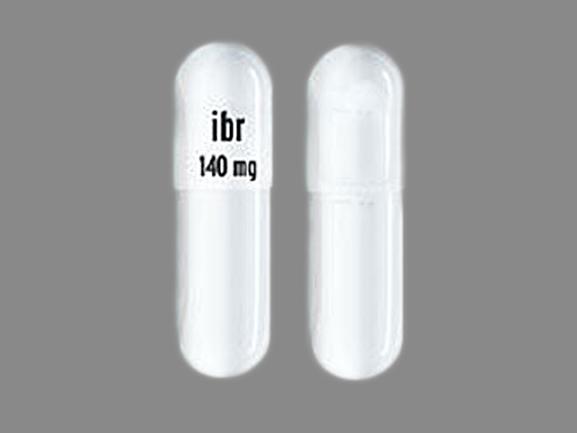Imbruvica and Alcohol/Food Interactions
There are 3 alcohol/food/lifestyle interactions with Imbruvica (ibrutinib).
Ibrutinib Food
Major Food Interaction
Ibrutinib should be taken once daily at approximately the same time everyday. Do not consume grapefruit, grapefruit juice, or Seville oranges unless directed otherwise by your doctor. Grapefruit and Seville oranges may significantly increase the blood levels of ibrutinib. This may increase the risk of side effects such as nausea, vomiting, diarrhea, abdominal pain, constipation, hemorrhage, kidney problems, and impaired bone marrow function resulting in low numbers of different types of blood cells. You may also be more likely to develop anemia, bleeding problems, or infections due to low blood cell counts. You should contact your doctor if you develop paleness, fatigue, dizziness, fainting, unusual bruising or bleeding, fever, chills, diarrhea, sore throat, muscle aches, shortness of breath, blood in phlegm, weight loss, red or inflamed skin, body sores, and pain or burning during urination. Also seek immediate medical attention if you experience signs and symptoms that may suggest kidney damage such as nausea, vomiting, loss of appetite, increased or decreased urination, sudden weight gain or weight loss, fluid retention, swelling, shortness of breath, muscle cramps, tiredness, weakness, dizziness, confusion, and irregular heart rhythm. It is important to tell your doctor about all other medications you use, including vitamins and herbs. Do not stop using any medications without first talking to your doctor.
Ibrutinib High Blood Pressure (Hypertension)
Moderate Potential Hazard, Moderate plausibility
ibrutinib - arrhythmias
Fatal and serious cardiac arrhythmias and cardiac failure have occurred with ibrutinib. These adverse reactions occurred in patients with and without preexisting hypertension or cardiac comorbidities; patients with cardiac comorbidities may be at greater risk of these events. Ventricular tachyarrhythmias, atrial fibrillation, and atrial flutter have occurred in patients treated with ibrutinib, especially in patients with acute infections or cardiac risk factors (including hypertension, diabetes mellitus, history of cardiac arrhythmia). Cardiac history and function should be evaluated at baseline, and patients should be monitored for cardiac arrhythmias and cardiac function. Further evaluation (e.g., ECG, echocardiogram) should be obtained as indicated for patients who develop symptoms of arrhythmia (e.g., palpitations, lightheadedness, syncope, chest pain), new onset dyspnea, or other cardiovascular concerns. Cardiac arrhythmias and cardiac failure should be managed appropriately, dosage modification guidelines should be followed, and the risks and benefits of continued ibrutinib treatment should be considered.
References
- (2023) "Product Information. Imbruvica (ibrutinib)." Pharmacyclics Inc, SUPPL-40
Ibrutinib High Blood Pressure (Hypertension)
Moderate Potential Hazard, Moderate plausibility
ibrutinib - hypertension
The use of ibrutinib may cause hypertension. Blood pressure should be monitored in patients treated with this drug. Antihypertensive medication should be started or adjusted throughout ibrutinib treatment as appropriate, and the dosage modification guidelines should be followed for grade 3 or higher hypertension.
References
- (2023) "Product Information. Imbruvica (ibrutinib)." Pharmacyclics Inc, SUPPL-40
Imbruvica drug interactions
There are 457 drug interactions with Imbruvica (ibrutinib).
Imbruvica disease interactions
There are 8 disease interactions with Imbruvica (ibrutinib) which include:
- arrhythmias
- bleeding
- cytopenia
- hepatic impairment
- hypertension
- infections
- renal impairment
- tumor lysis syndrome
More about Imbruvica (ibrutinib)
- Imbruvica consumer information
- Check interactions
- Compare alternatives
- Pricing & coupons
- Reviews (60)
- Drug images
- Side effects
- Dosage information
- Patient tips
- During pregnancy
- FDA approval history
- Drug class: BTK inhibitors
- Breastfeeding
- En español
Related treatment guides
Drug Interaction Classification
| Highly clinically significant. Avoid combinations; the risk of the interaction outweighs the benefit. | |
| Moderately clinically significant. Usually avoid combinations; use it only under special circumstances. | |
| Minimally clinically significant. Minimize risk; assess risk and consider an alternative drug, take steps to circumvent the interaction risk and/or institute a monitoring plan. | |
| No interaction information available. |
Further information
Always consult your healthcare provider to ensure the information displayed on this page applies to your personal circumstances.


